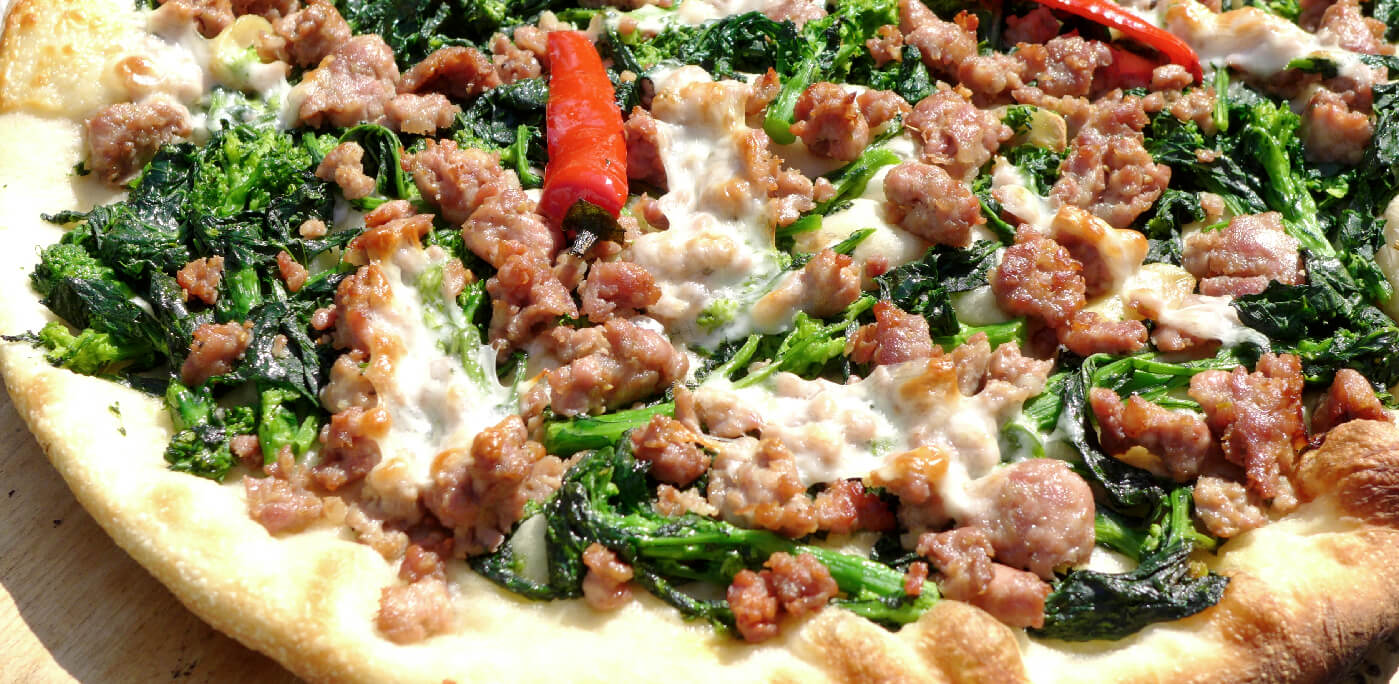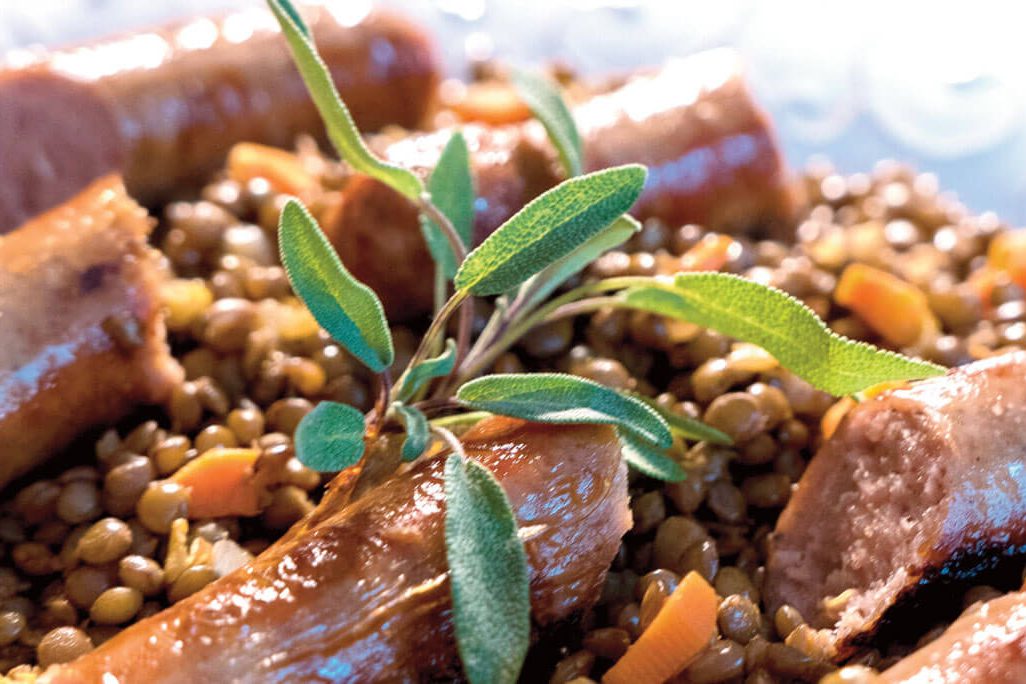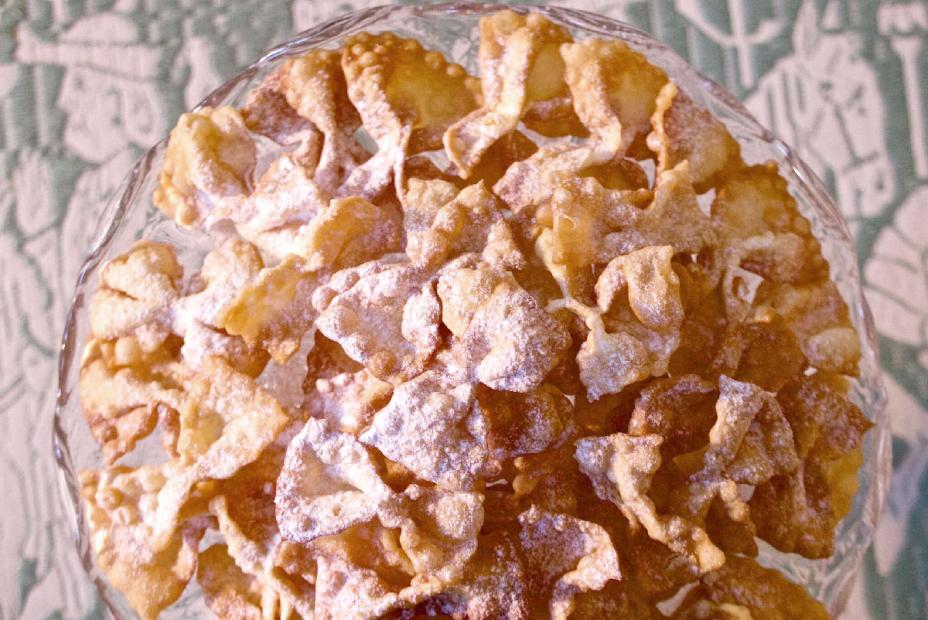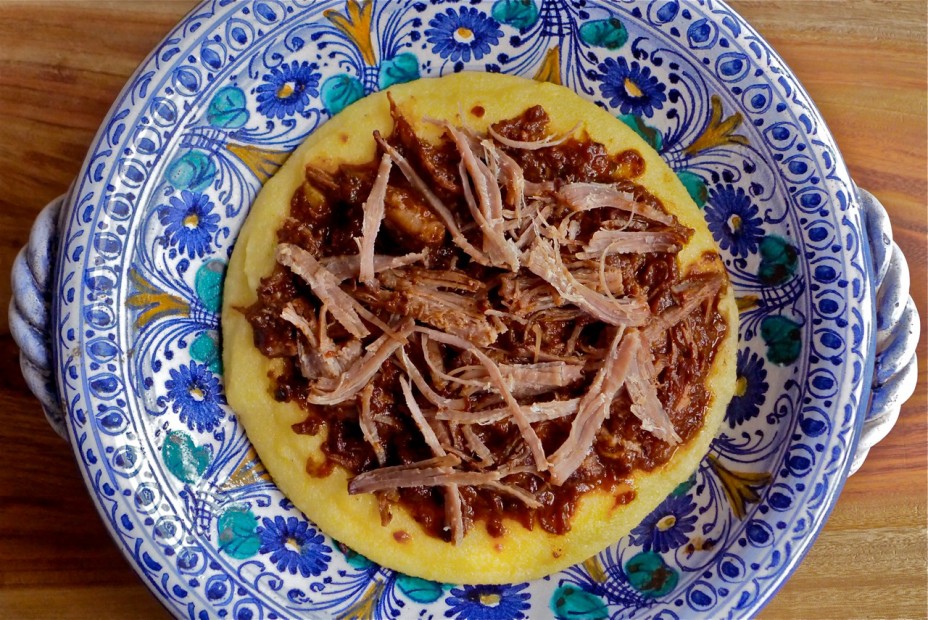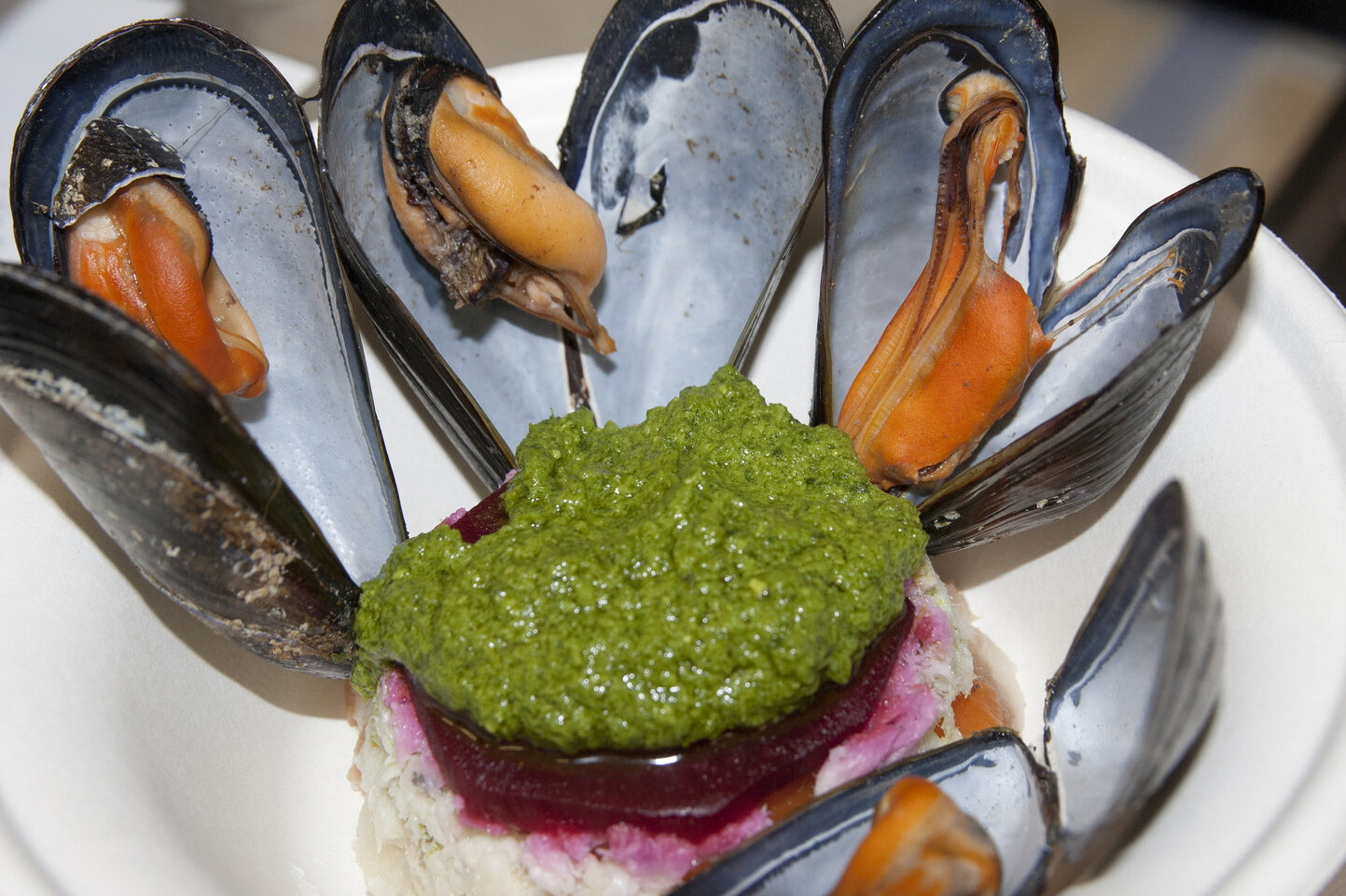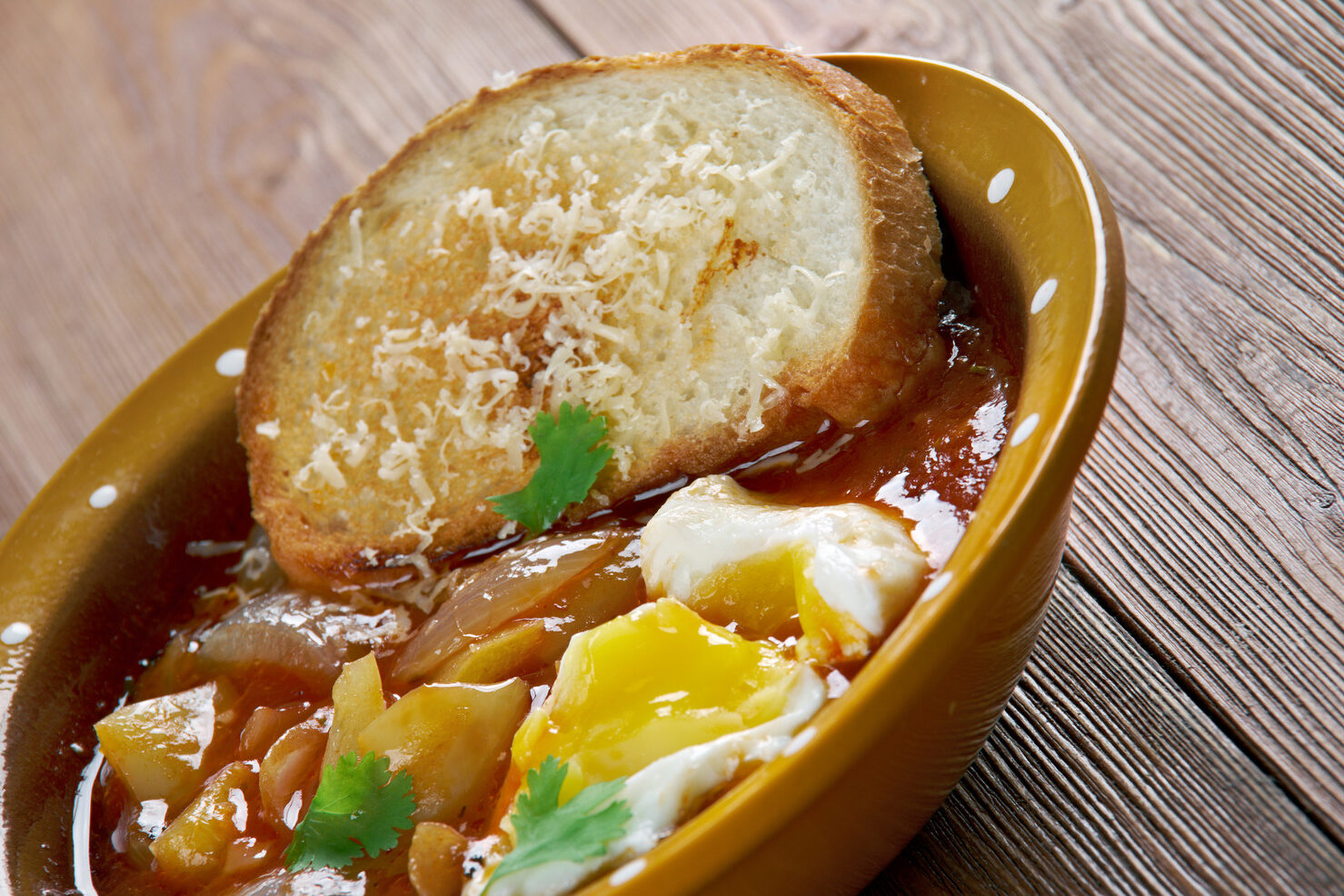It’s hard to beat a well-made pizza margherita whose colors are the very symbol of Italy, but in the cool of autumn, I find myself craving a more hefty—and healthy—pie topped with pork sausage and broccoletti di rapa, a variation on the pizza theme that has its roots in the peasant experience and bold cucina povera of Puglia. Let me pause at the outset and admit that the Americanization of the Italian word for the vegetable, i.e. “broccoli rabe,” or even “robb” are so grating to my ear as to make me avoid using it. Victor Hazan said it best: “Marcella called them cime di rapa, which is an accurate description. For American cooks, I accept and use rapini, which I have heard used in Italy. We must resign ourselves to reserving broccoletti di rapa for native Italian speakers only, while turning a deaf ear to broccoli rabe.” I’m with him.
The greens, also variously friarielli, vrucculi, rapi and a gaggle of other aliases depending on what part of Italy you are in, have a cult following in Italy’s sunbaked southern regions, where they were long considered carne vegetale – “vegetarian meat” at a time when animal protein was scarce. Throughout southern Italy, its virtues have been extolled in poetry, song, and folklore, much like those ascribed to Popeye’s magical can of spinach. “[Rapini is] Italian soul food,” says Anthony Di Renzo, author of Bitter Greens: Essays on Food, Politics, and Ethnicity from the Imperial Kitchen. “Since classical times, [it] has sustained and defined the dispossessed of the Mezzogiorno.”
Even so, the greens were virtually unknown in the States outside of Italian-American enclaves until some fifty years ago when they were dubbed “rapini” or more often, “broccoli rabe” by the produce industry, most likely as a way of circumventing the English translation’s ugly meaning.
If the nicknames make native Italians itch, they are not the only slings and arrows the vegetable has endured since being transplanted in American soil. It has never enjoyed the popularity of its blander lookalike, everyday broccoli, and can languish in produce aisles, passed over by shoppers who simply don’t know how to cook it. Yet the trick to taming it is simple: Parboiling it briefly (note: not steaming), tempers its bracing bitterness while keeping its pleasant pungency and goodness intact. As rich in iron, phosphorous, calcium and vitamins C, B-2 and A as they are high in fiber, the greens are considered to have potent properties against cancer and heart disease. According to the National Cancer Institute, the compounds concentrated in these members of the mustard family actually inactivate carcinogens.
Here is my take on Puglia’s traditional dish adapted for the American kitchen.
Pizza with Rapini and Sausage Topping
Makes a 12-inch round pizza
Use a basic pizza dough recipe for the crust or, for a quicker dish, substitute a good store-bought one. If you have a baking stone, all the better. Otherwise, a baking pan will do.
Ingredients:
• 1-1/2 pounds pizza dough
• extra-virgin olive oil
• 1 bunch rapini
• 2 tablespoons kosher salt
• 6 large cloves garlic, peeled and sliced
• fresh hot chili pepper such to taste, sliced (optional)
• 1/2 pound sweet Italian pork sausage meat
• cornmeal
• 1 cup semi-soft sheep cheese or semi-aged Asiago, sliced or shredded
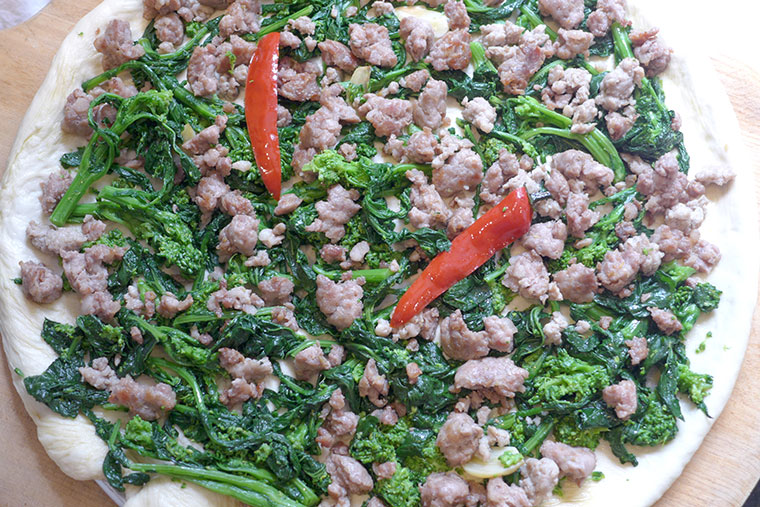
To prepare the dough:
Place the dough in a large, lightly oil mixing bowl. Lightly brush the surface with olive oil. Cover tightly with plastic wrap. Let rise in a draft-free place until doubled, about 1 hour.
To make the pizza:
1. Fill a pot with enough water to cover the greens and bring to a rolling boil.
2. Meanwhile, using a large knife, trim off any discolored tips from the stems. Using a paring knife, peel the stems as you would asparagus legs. Separate the stems from the crowns. Cut the stems into 2-inch pieces, leaving the crowns intact. Wash the greens in abundant cold water; drain.
3. To the boiling water add the kosher salt, followed by the rapini. Cook over medium-high heat until tender, 3 minutes. Drain.
4. In an ample skillet, warm 3 tablespoons of the olive oil over medium-low heat. Add the sliced garlic. Sauté until the garlic is golden, about 4 minutes; remove and reserve.
5. Add the drained greens and hot pepper, if using, to the skillet and toss. Cover and warm over low heat, about 3 minutes. Drain again and set aside.
6. In a second skillet, warm 1 tablespoon olive oil. Add the crumbled sausage and saute until lightly browned, about 6 minutes.
7. Stretch the dough onto a lightly oiled, cornmeal-dusted pizza pan, baking sheet, or baking stone. Prick the surface. Brush the rim lightly with olive oil and arrange the sauteed rapini, reserved garlic, and sausage on the pie. Cover with plastic wrap and let rise in a warm place, about 30 minutes. In the meanwhile, preheat an oven to 500 degrees F.
8. Slide the pizza onto the middle rack of the oven and bake until the edges are puffy and browned and the dough is cooked through, about 7 minutes. Remove it a minute before it is done to top it with the cheese and return it to the oven. Allow to settle for 5 minutes before cutting.
Julia della Croce is a print & broadcast journalist and James Beard award-winning cookbook author, cooking teacher, culinary consultant & recipe developer. You can visit her on her website, www.juliadellacroce.com and blog, http://juliadellacroce.com/forktales1/Connect on Facebook: Julia della Croce – chef & foodwriter Twitter: @juliadellacroce, Instagram: juliadellacroce
